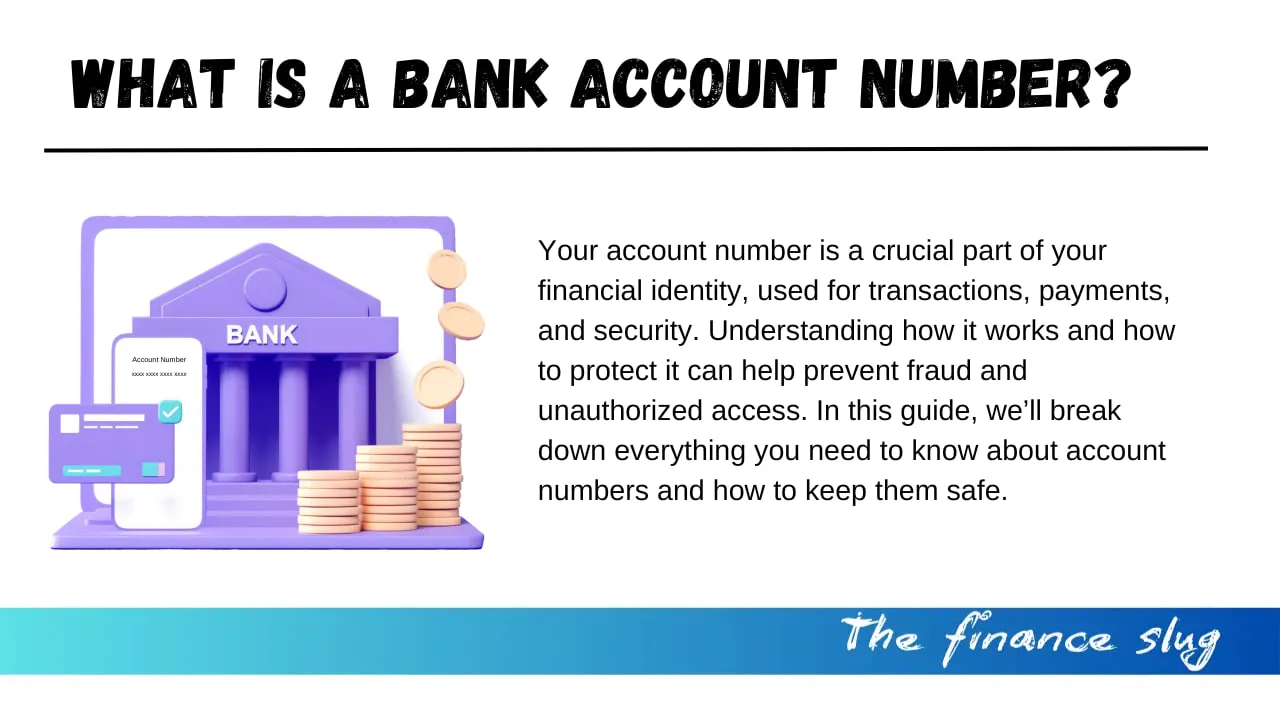
In the modern financial world, an account number is one of the most crucial identifiers used by banks and financial institutions to manage and track customer accounts. Whether you’re depositing a paycheck, transferring money online, or setting up auto-pay for bills, your account number plays a vital role in ensuring the correct transactions take place.
In this detailed guide, we’ll cover everything about account numbers—from their definition and structure to their importance, security risks, and best practices for protection.
What is an Account Number?
An account number is a unique numerical identifier assigned by a bank or financial institution to an individual’s or business’s account. It is used to distinguish one account from another and ensures that financial transactions are properly processed.
Structure of an Account Number
- Account numbers vary in length depending on the country and the financial institution.
- In the U.S., account numbers typically range from 8 to 12 digits.
- In international banking, an account number may be combined with an IBAN (International Bank Account Number) for cross-border transactions.
- It is often paired with a routing number (or sort code in the UK) to identify the specific bank branch.
Types of Account Numbers
There are various types of account numbers, depending on the type of financial account. Here are the most common ones:
1. Bank Account Number
- Used for checking and savings accounts.
- Required for direct deposits, wire transfers, and bill payments.
2. Credit Card Number
- A 16-digit number that uniquely identifies a credit card.
- Includes details such as the card issuer, account type, and security code.
3. Investment Account Number
- Assigned to brokerage or trading accounts for stock and mutual fund investments.
- Used to track securities and transactions.
4. Loan Account Number
- Given to customers with mortgages, car loans, or personal loans.
- Used for loan repayments and tracking outstanding balances.
Also Read 👉 Dave Portnoy Fires Back at Crypto Manipulation Allegations
Importance of an Account Number
An account number is more than just a series of digits—it plays a critical role in financial transactions and account security.
1. Ensures Accurate Transactions
- An account number makes sure your money goes to the right place.
- Any error in the number could lead to misdirected funds.
2. Helps in Tracking and Managing Accounts
- Banks and financial institutions use account numbers for internal tracking.
- They also help in managing multiple accounts efficiently.
3. Necessary for Online Banking
- Digital transactions require an account number to authenticate payments.
- Used for linking bank accounts with payment apps like PayPal, Venmo, or Zelle.
How to Find Your Account Number?
You can find your account number in multiple ways:
1. On a Bank Statement
- Most bank statements display the account number at the top or bottom.
2. On a Check
- Typically printed at the bottom of a check, next to the routing number.
3. Through Online Banking
- Log in to your online banking account and navigate to the “Account Details” section.
4. Bank Customer Service
- You can contact your bank’s customer support to retrieve your account number securely.
Also Read 👉 Account in Trust: The Key to Secure Financial Planning
How to Keep Your Account Number Safe?
Your account number is sensitive financial information. Protecting it is essential to prevent fraud and unauthorized transactions.
1. Never Share Your Account Number Publicly
- Avoid sharing it over unsecured communication channels (e.g., email, social media).
2. Enable Two-Factor Authentication (2FA)
- Adds an extra layer of security when logging into online banking.
3. Monitor Your Account Activity
- Regularly check bank statements and transaction history for suspicious activities.
4. Use Secure Banking Apps
- Only use official bank apps for transactions and avoid third-party apps with unknown security measures.
5. Report Lost or Stolen Information Immediately
- If you suspect fraud, contact your bank immediately to secure your account.
Common Account Number Fraud and How to Avoid It
1. Phishing Scams
- Fraudsters send emails or messages pretending to be from a bank to steal your account number.
- Prevention Tip: Never click on suspicious links or provide details to unverified sources.
2. Data Breaches
- Hackers may steal banking information from insecure databases.
- Prevention Tip: Use strong, unique passwords and enable alerts for unusual transactions.
3. Check Fraud
- Criminals forge or alter checks to withdraw money from someone’s account.
- Prevention Tip: Use digital payments instead of physical checks whenever possible.
Also Read 👉 Mastering The Term Account Balance: Unique Strategies for Success
Account Number vs. Routing Number: What’s the Difference?
| Feature | Account Number | Routing Number |
|---|---|---|
| Purpose | Identifies the individual’s account | Identifies the bank or financial institution |
| Length | 8-12 digits (varies by bank) | 9 digits (U.S. banks) |
| Usage | For direct deposits, transactions, and account identification | Helps route the transaction to the correct bank |
| Found On | Bank statements, checks, online banking | Bottom of checks, bank documents |
Conclusion
An account number is a critical component of banking and financial security. It ensures that transactions are processed correctly, helps in managing finances, and requires strong security measures to prevent fraud. Understanding your account number, how to protect it, and recognizing the risks of fraud will help you manage your finances safely.
Frequently Asked Questions (FAQs)
1. Can I change my account number?
Most banks do not allow customers to change their account numbers unless fraud or security concerns arise.
2. Is my account number the same as my card number?
No. A bank account number is different from a debit or credit card number.
3. What should I do if I share my account number accidentally?
Immediately inform your bank and monitor your account for any unauthorized transactions.
4. Can someone withdraw money with just my account number?
No, but they could attempt fraud. Always safeguard your financial details.
5. How do I verify if my account number is correct?
You can verify your account number through online banking, bank statements, or by calling your bank’s customer service.
Stock Market Crash Today: A Bloodbath on Monday – What You Need to Know
Published on financeslug.xyz The global financial markets are reeling from a massive sell-off, and Indian…
Wall Street Bonuses Reach Record $47.5 Billion in 2024, Up 34% from Previous Year
How to Convert Delimited CSV Data into Columns in Excel
CSV (Comma-Separated Values) files are widely used for data exchange, but when opened in Excel,…
Harvard University Announces Free Tuition for Families Earning $200K or Less
Harvard’s New Tuition-Free Policy: What You Need to Know Harvard University has unveiled a groundbreaking…
Eli Lilly’s 1.8B Dollar Investment in Weight Loss Drugs
Ireland’s Weight-Loss Drug Boom: A Game-Changer for Economy and Healthcare Ireland is witnessing a surge…
Forever 21 Files for Bankruptcy Again: The End of an Era in Fast Fashion?
Forever 21, once a staple in American malls and a leader in the fast-fashion industry,…







